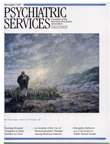HIV Risk Factors Among People With Severe Mental Illness in Urban and Rural Areas
Abstract
No studies have reported HIV risk behavior in rural populations with severe mental illness. A total of 84 rural patients with severe mental illness in New Hampshire and 158 urban patients in Baltimore were interviewed about their HIV risk behavior in the past six months using the Risk Assessment Battery, a 38-item structured clinical interview. Rates of sexual and drug risk behavior among rural patients were significantly lower than among urban patients. Regression analyses showed that urban setting, younger age, never having been married, and a bisexual or gay orientation significantly predicted higher HIV risk scores. The differences in risk behaviors may reflect urban-rural differences in drug availability and sexual practices.



